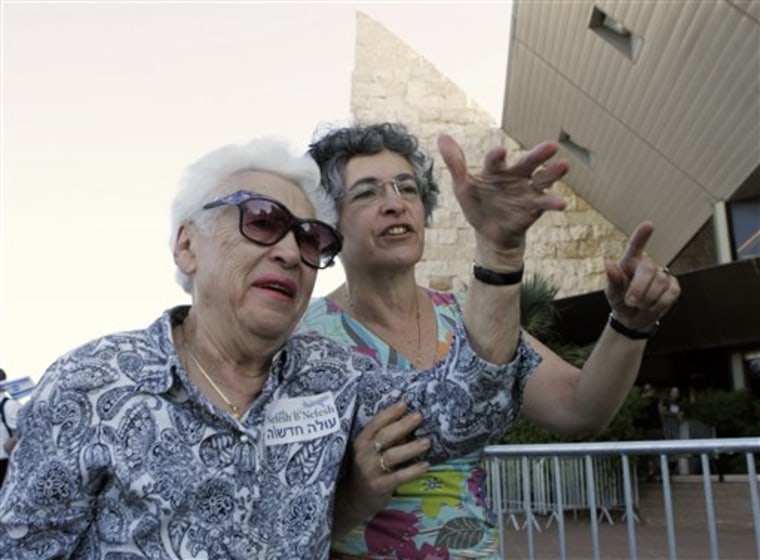When 88-year-old Frances Greenberg walked off an El Al passenger jet and into an air-conditioned terminal on Tuesday, it was her second time trying to move to Israel.
The first was in 1947, on the "Exodus," a rickety ship crowded with Holocaust survivors who were turned back by the British and returned to war-ravaged Europe.
"The last time I was alone, the last survivor of my family," said the tiny, white-haired Greenberg. She was 27, and the Jewish state did not yet exist.
When, under British guard, she steamed back toward Europe and saw the shores of Palestine recede behind her, Greenberg remembered being "heartbroken." But she married soon after being returned to the continent she had tried to flee, and followed her husband, Isak, a fellow Holocaust survivor, to the United States.
No British to stop her
Six decades later, there were no British to stop her. Instead, she was greeted at the airport by her daughter, who has lived in Israel since the 1970s, and three of her grandchildren. An Israeli lawmaker was on hand to present her with a new Israeli passport.
In 1947, Greenberg was among 4,500 refugees packed on board the creaky "Exodus 1947." The ship was an old American passenger steamer that had been converted to a military transport during the war and then purchased by the pre-state Jewish authorities in Palestine to bring Jews to the country.
Many of the passengers were their families' sole survivors. When they arrived off the shore of Palestine, the ship was seized by British sailors.
The British, who controlled Palestine and were cracking down on illicit Jewish immigration, transferred them to three other ships and sent them back to Europe, where they eventually ended up in detention camps in a British-occupied zone of postwar Germany.
Greenberg said her parents, her two sisters and brother were among the 6 million Jews killed by the Nazis during the war. She said she did not know how or when they died. She survived the Nazi onslaught by fleeing east from her hometown of Sierpc, Poland, into the Soviet Union.
"Exodus" helped gain support for Jewish state
The "Exodus" incident shocked the world and came to symbolize the plight of Jewish survivors in Europe after the war. It deeply embarrassed the British and helped galvanize support for the establishment of a Jewish state. It also inspired a best-selling novel by Leon Uris and a 1960 movie starring Paul Newman.
The British pulled out and the state of Israel was established on May 14, 1948, triggering a war between Arabs and Jews.
Before departing for Palestine on the "Exodus," she had met Isak Greenberg in a displaced persons camp. He loved her, she said, but they parted ways because she was a Zionist and dreamed of going to Palestine, while he planned to go to America. When she arrived back in Germany after her ordeal, he came to see her, and this time she agreed to join him.
Greenberg has visited Israel since then, but says it wasn't until after Isak died last year that she revived her dream of living in the Jewish state.
This week, she left her home in Pittsburgh, Pa., and flew to Israel on a flight arranged by Nefesh B'Nefesh, a group that helps Jews from Western countries move to Israel. More than 200 other American immigrants were on the plane. Loudspeakers at the airport blared Israeli folk songs, and children waved Israeli flags.
"America was good to me," Greenberg said. "I hope Israel will be good, too."
